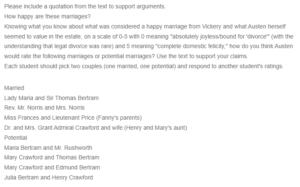How Happy Marriage Are These Days
Marriage or spouse finding has long been one of the ordinary activities, but simultaneously, masked in mystery. One commonly asked question to couples is how you met and how you ended up together. People might have wondered about marriages or relationships in these ways. Presently, accomplishing marital happiness has nearly become a business. It is not shocking that this is the primary issue in Jane Austen’s Letters. Austen argues that happiness in marriage is entirely a matter of chance (Austen, 2009). This means it is better to realize as little as possible the imperfections of the individual with whom you are to pass your life. For example, Austen answers Fanny Knight about MR A and B. She says, “Think of this, entire Fanny. Mr. A. has advantages that do not often meet in one person. His only fault, indeed, seems modesty.” The quote identifies the faults in a perfect match or relationship (Fergus, 2009).
Therefore, for Lady Maria and Sir Thomas Bertram’s marriage, Austen would rate this as five meaning (complete domestic felicity) because they love each other and even care for their extended families. Austen’s word to Fanny supports this marriage. It states, “I shall turn around and plead with you to commit yourself farther and never think of accepting him unless you like him. Anything is to be endured and preferred rather than marrying without affection, and if his deficiencies of manner strike you more than all the good qualities and you continue to think strongly, then give him up a chance at once” (Austen, 2009). However, Maria Bertram and Mr. Rushworth’s potential relationship would be rated zero (absolutely joyless/bound for divorce) because Maria Bertram is in a relationship with MR. Rushworth because of financial dependence due to his wealth, yet genuinely, she desired and loved Henry. The relationship is not solidified by affection but by monetary advantages and many concealed secrets. As such, it is deemed to fail or end in a divorce. As Fullmer (2000) says, love remains the mistaken exception, as the wits put it, Love in a cottage (p.41). This meant that women in previous times never married or got into relationships because of love. Still, because they were chosen and men provided everything, love was the faulty exclusion.
References
Austen, J. (2009). Jane Austen’s letters to her sister Cassandra and others. Oxford Text Archive Core Collection.
Fergus, J. (2009). The Literary Marketplace. A Companion to Jane Austen, pp. 104, 41.
Fullmer, J. Z. (2000). The Gentleman’s Daughter: Women’s Lives in Georgian England. Journal of Women’s History, 11(4), 234-234.
ORDER A PLAGIARISM-FREE PAPER HERE
We’ll write everything from scratch
Question
Please include a quotation from the text to support arguments.
How happy are these marriages?
Knowing what you know about what was considered a happy marriage from Vickery and what Austen herself seemed to value in the estate, on a scale of 0-5 with 0 meaning “absolutely joyless/bound for ‘divorce'” (with the understanding that legal divorce was rare) and 5 meaning “complete domestic felicity,” how do you think Austen would rate the following marriages or potential marriages? Use the text to support your claims.
Each student should pick two couples (one married, one potential) and respond to another student’s ratings.

How Happy Marriage Are These Days
Married
Lady Maria and Sir Thomas Bertram
Rev. Mr. Norris and Mrs. Norris
Miss Frances and Lieutenant Price (Fanny’s parents)
Dr. and Mrs. Grant Admiral Crawford and wife (Henry and Mary’s aunt)
Potential
Maria Bertram and Mr. Rushworth
Mary Crawford and Thomas Bertram
Mary Crawford and Edmund Bertram
Julia Bertram and Henry Crawford

